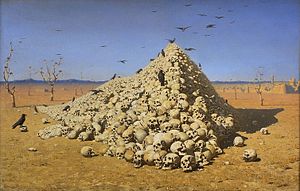In Claude Lanzmann’s monumental documentary film “Shoah,” on the Holocaust, he interviews Filip Müller, a Czech Jew who survived the liquidations in Auschwitz as a member of the “special detail.” Müller relates this story:
“One day in 1943 when I was already in Crematorium 5, a train from Bialystok arrived. A prisoner on the ‘special detail’ saw a woman in the ‘undressing room’ who was the wife of a friend of his. He came right out and told her: ‘You are going to be exterminated. In three hours you’ll be ashes.’ The woman believed him because she knew him. She ran all over and warned to the other women. ‘We’re going to be killed. We’re going to be gassed.’ Mothers carrying their children on their shoulders didn’t want to hear that. They decided the woman was crazy. They chased her away. So she went to the men. To no avail. Not that they didn’t believe her. They’d heard rumors in the Bialystok ghetto, or in Grodno, and elsewhere. But who wanted to hear that? When she saw that no one would listen, she scratched her whole face. Out of despair. In shock. And she started to scream.”
Blaise Pascal wrote in “Pensées,” “We run heedlessly into the abyss after putting something in front of us to stop us from seeing it.”
Hannah Arendt, in writing “Eichmann in Jerusalem,” noted that Adolf Eichmann was primarily motivated by “an extraordinary diligence in looking out for his personal advancement.” He joined the Nazi Party because it was a good career move. “The trouble with Eichmann,” she wrote, “was precisely that so many were like him, and that the many were neither perverted nor sadistic, that they were, and still are, terribly and terrifyingly normal.”



No comments:
Post a Comment